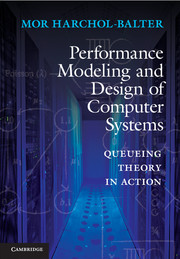Book contents
- Frontmatter
- Contents
- Preface
- Acknowledgments
- I Introduction to Queueing
- II Necessary Probability Background
- 3 Probability Review
- 4 Generating Random Variables for Simulation
- 5 Sample Paths, Convergence, and Averages
- III The Predictive Power of Simple Operational Laws: “What-If” Questions and Answers
- IV From Markov Chains to Simple Queues
- V Server Farms and Networks: Multi-server, Multi-queue Systems
- VI Real-World Workloads: High Variability and Heavy Tails
- VII Smart Scheduling in the M/G/1
- Bibliography
- Index
5 - Sample Paths, Convergence, and Averages
from II - Necessary Probability Background
Published online by Cambridge University Press: 05 February 2013
- Frontmatter
- Contents
- Preface
- Acknowledgments
- I Introduction to Queueing
- II Necessary Probability Background
- 3 Probability Review
- 4 Generating Random Variables for Simulation
- 5 Sample Paths, Convergence, and Averages
- III The Predictive Power of Simple Operational Laws: “What-If” Questions and Answers
- IV From Markov Chains to Simple Queues
- V Server Farms and Networks: Multi-server, Multi-queue Systems
- VI Real-World Workloads: High Variability and Heavy Tails
- VII Smart Scheduling in the M/G/1
- Bibliography
- Index
Summary
If you are a theoretician, you probably are already starting to get uncomfortable with the way we use the word “average” without carefully defining it and, in particular, with the way we define the load ρ by seemingly dividing two averages. Everything we have said is correct, but we would like to prove this, rather than just assuming it. This chapter sets up the groundwork to allow us to make such claims about averages.
Before we can talk about averages, we first need to discuss convergence of random variables. In this chapter, we define the convergence of random variables and state some limit theorems. We then define two types of averages: ensemble averages and time averages. These are needed for the next chapter on Little's Law, which will allow us to formally relate mean response time to the mean number of jobs in the system and to properly define the load, ρ.
This chapter is more theoretically oriented and abstract than the rest of this book. It is not necessary for the reader to follow everything in this chapter to understand later chapters. A reader might wish to skim the chapter to pick up the basic terminology and then come back later for a more in-depth reading.
Although this chapter is somewhat formal, we are still just grazing the surface of this material. If you really want to understand the concepts in depth, we recommend reading a measure-theory book such as Halmos's book [80].
- Type
- Chapter
- Information
- Performance Modeling and Design of Computer SystemsQueueing Theory in Action, pp. 79 - 92Publisher: Cambridge University PressPrint publication year: 2013



